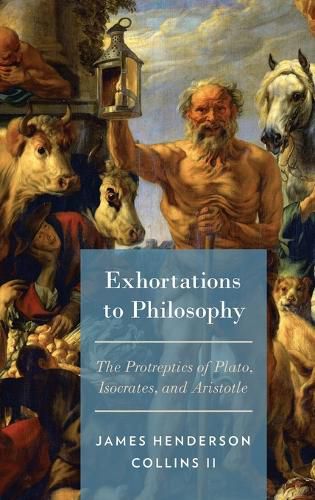Readings Newsletter
Become a Readings Member to make your shopping experience even easier.
Sign in or sign up for free!
You’re not far away from qualifying for FREE standard shipping within Australia
You’ve qualified for FREE standard shipping within Australia
The cart is loading…






This book is a study of the literary strategies which the first professional philosophers used to market their respective disciplines. Philosophers of fourth-century BCE Athens developed the emerging genre of the protreptic (literally, turning or converting ). Simply put, protreptic discourse uses a rhetoric of conversion that urges a young person to adopt a specific philosophy in order to live a good life. The author argues that the fourth-century philosophers used protreptic discourses to market philosophical practices and to define and legitimize a new cultural institution: the school of higher learning (the first in Western history). Specifically, the book investigates how competing educators in the fourth century produced protreptic discourses by borrowing and transforming traditional and contemporary voices in the cultural marketplace. They aimed to introduce and promote their new schools and define the new professionalized discipline of philosophy. While scholars have typically examined the discourses and practices of Plato, Isocrates, and Aristotle in isolation from one another, this study rather combines philosophy, narratology, genre theory, and new historicism to focus on the discursive interaction between the three philosophers: each incorporates the discourse of his competitors into his protreptics. Appropriating and transforming the discourses of their competition, these intellectuals created literary texts that introduced their respective disciplines to potential students.
$9.00 standard shipping within Australia
FREE standard shipping within Australia for orders over $100.00
Express & International shipping calculated at checkout
This book is a study of the literary strategies which the first professional philosophers used to market their respective disciplines. Philosophers of fourth-century BCE Athens developed the emerging genre of the protreptic (literally, turning or converting ). Simply put, protreptic discourse uses a rhetoric of conversion that urges a young person to adopt a specific philosophy in order to live a good life. The author argues that the fourth-century philosophers used protreptic discourses to market philosophical practices and to define and legitimize a new cultural institution: the school of higher learning (the first in Western history). Specifically, the book investigates how competing educators in the fourth century produced protreptic discourses by borrowing and transforming traditional and contemporary voices in the cultural marketplace. They aimed to introduce and promote their new schools and define the new professionalized discipline of philosophy. While scholars have typically examined the discourses and practices of Plato, Isocrates, and Aristotle in isolation from one another, this study rather combines philosophy, narratology, genre theory, and new historicism to focus on the discursive interaction between the three philosophers: each incorporates the discourse of his competitors into his protreptics. Appropriating and transforming the discourses of their competition, these intellectuals created literary texts that introduced their respective disciplines to potential students.